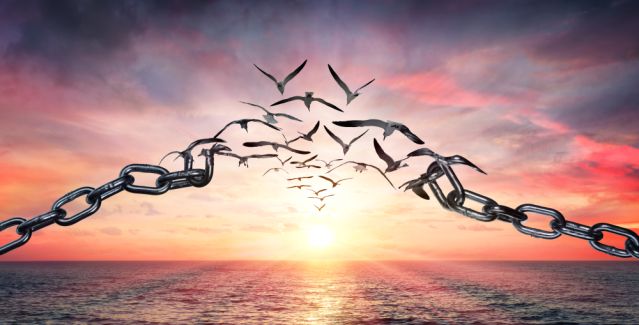Forgiveness
Breaking Free of Grudges
The healing power of forgiveness.
Posted October 27, 2023 Reviewed by Monica Vilhauer
Key points
- Grudges can be hazardous to your mental and physical health.
- Grudges can mean giving more power to the person who hurt you.
- Forgiveness and letting go is a process — and more for you than the other person.

“I couldn’t believe it,” my long-time friend Maurice told me recently. “I ran into X at an industry function lately. I hadn’t seen her in years! I went over and greeted her warmly. But she wasn’t just rude. She was hostile. I can’t understand. Do you think she’s anti-Semitic?”
I shook my head, remembering. Maurice and X are both film and television actors. (She is X here because her name is instantly recognizable.) In 1972, when the three of us were close friends, X wanted to be more than friends with Maurice and invited him to dinner at her house. He declined not one but three invitations for intimate, candlelight dinners, telling her finally that he valued her friendship but wasn’t interested in romance. She was disappointed. But she seemed to take his lack of romantic interest in stride back then, though she gradually distanced herself from both of us over the next few years.
And now this. “I think she’s holding a grudge over your lack of romantic interest in her,” I said.
Maurice looked incredulous. “But that was more than 50 years ago!” he said. “Who holds a grudge for 50 years?”
We looked at each other, sighed and agreed that it was possible with X.
Reflecting on this afterwards, I felt sad for her. How awful it must feel to carry so much anger and bitterness for more than half a century! From what I’ve observed from a distance, her life has had some major, well-deserved high points professionally, but personal happiness appears somewhat elusive, with a string of broken romantic relationships over the years.
Grudges can darken lives for years and for many reasons. Another friend told me about a woman in her cancer survivors’ group who constantly complains that her mother destroyed her life. The woman is 82 years old, her mother long dead.
Grudges can separate families, sometimes forever. Grudges can keep people stuck in anger, bitterness and blame, negatively impacting subsequent relationships. Grudges can keep you rooted in the past instead of finding joy in the present. In holding a grudge, you unwittingly give the other person negative power over your life and emotions instead of moving on and creating a new and better life for yourself.
Studies have found that holding a grudge not only may be detrimental to your quality of life, but also to your physical health. One recent study found that holding a grudge means living with intrusive negative thoughts that can be triggered easily even when feelings of hurt and anger appear to dissipate, impacting one’s quality of life. Another study has found that people who hold grudges are more likely to have a history of pain disorders, cardiovascular disease and stomach ulcers.
So why would anyone hold a grudge? Some hold onto hurt and anger because they feel unfairly treated and are waiting, sometimes forever, for an apology. Some hold grudges because it seems to be a show of strength: refusing to forgive even though the other person apologizes, even perhaps pleading for forgiveness to no avail. Still others, deeply wounded by a traumatic past with family members, feel that to let go and forgive is to negate the seriousness of the transgressions, letting the other person off the hook, minimizing the depth of the pain.
But grudges mean giving power away. They can mean lost opportunities for growing past one’s pain.
Forgiving and letting go of hurt and anger doesn’t mean saying the other person is right or that your pain isn’t justified. And, to be sure, it isn’t easy. It’s a process that may take time and tears and a lot of work.
If you’re carrying anger and resentment, expressing those feelings and then letting go, can take a number of forms, sometimes in combination. Therapy can help. Journaling can be a valuable way for you to find your voice and sort out your feelings. If you’re a survivor of a traumatic event or series of events, joining a therapeutic group may help you to feel less alone and more empowered in your process of healing.
It's important to remember that forgiveness isn’t primarily (or ever) for the person who wronged you, but for yourself. In fact, forgiveness does not have to include reconciliation. There may be times when it is impossible to reconcile – if the other person has died – or inappropriate to reconcile if the other person was abusive. But forgiveness can calm your spirit and give you a fresh perspective on what happened back then and why. By looking back at the person who hurt you, not with bitterness, but with empathy and compassion, you may be able to let that pent-up anger go. For example, seeing an abusive parent as someone who had a traumatic past of his or her own can make what happened with you more understandable. Not okay. Not ever okay. But more understandable. With that, you can begin to move on.
Forgiveness can help you to let go of anger, resentment and bitterness and feel a new sense of well-being. Even if pain still lingers, you may be on the way to growing past what was to a calmer, happier, more positive mindset. You’ll be better able to improve the quality of your relationships and your physical and emotional health. You may even find yourself viewing the person or persons who hurt you through a new lens – one of empathy and compassion – that, once again, can free you to move on.
Forgiveness is healing. It means freedom from a painful past, empowering you to create and to embrace a brighter present and future.
References
Examining the lived experience of holding grudges. vanMonsjou, E., Struthers, C.W., Fergus, K. & Muse, A. (2023), Qualitative Psychology, 10(1), 60-78. https://doi.org 110.1037/qup0000205
Bearing grudges and physical health: relationship to smoking, cardiovascular health and ulcers. Messias, E., Saini, A, Sinato, P, Welch, S.Social Psychiatry and Psychiatric Epidemiology, 45, 183-187. (2010)




